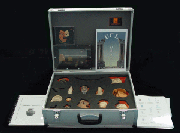Heritage and wellbeing workshop, or can heritage heal?
On Wednesday 25 June 2014 a very well attended workshop on the relationship between heritage and wellbeing took place under the auspices of new UCL centre for museums, heritage and material culture studies.
The aim of the workshop was to bring together those interested in the broad topic of ‘heritage and wellbeing’, including medical professionals, researchers, arts curators, and museum, library and archive workers to work towards the creation of a critical framework for assessing wellbeing in the context of heritage. The background to this seminar was an ongoing research project jointly run by UCL Museums and Collections and UCL Hospitals to exploring the potential benefits of museum object-handling sessions for patients and visitors.

A UCL Museums loan box, of the sort taken out into the hospitals. For more info visit the UCL Museums and Collections site.
This is clearly an exciting area for research, not least because many of the presenters contrasted their own anecdotal experience of the positive impact of contact with heritage materials with the lack of research data to support their case, or even to provide a more nuanced understanding of when such interventions may or may not be appropriate.
The vast majority of the presentations related to museums and material culture, which suggests that there is scope for archivists to get more involved in this discussion. One very notable exception was Judith Etherton, Borough Archivist, Valence House Museum (Barking and Dagenham) whose fascinating talk explored how archivists can better support people doing genealogical research, many of whom are doing it not as a leisure pursuit but as a means to provide answers to traumatic episodes in their past (such as adoption). Similarly, archivists can act as facilitators for terminally ill parents compiling ‘memory boxes’ for their children, by directing them towards sources of information about their family and their neighbourhood but also by offering advice on conservation techniques which can ensure that precious letters and photos intended to be opened as some future date (a child’s 18th birthday, for example) are kept safe until they are needed. In short, “therapists know that sense of place and sense of belonging are key components of sound mental health” and archivists are uniquely placed to deliver this. You can read more about Judith’s research here (if you or your library has online access to the journals).
Some of the later speakers took on the them in more general terms and sounded notes of caution. Beverley Butler questioned whether there has been a shift from thinking about the past as a redemptive force in theological sense to the idea of heritage as therapy and, if so, what the implications of this might be (heritage as quick fix for social or economic deprivation, for example). And, drawing on material from fieldwork with older people in Haringey, Mike Rowlands sought to underline the extent to which there is always an element of choice in heritage; we choose how we wish to tell our stories what objects and documents we wish to carry through life with us, even if we can no longer determine what has happened to us. Any notion of heritage as therapy needs to bear this in mind; heritage, like memory, is always already a ’strategy’, not something pre-determined and fixed, waiting to be unearthed by therapist-heritage professional.
One of the questions that I came away with was the issue of the extent to which it is possible to scale this work and these findings up from the individual to the collective. Is there such a thing as “community wellbeing” (the government would, I feel, certainly like there to be) and if so who decides how the community feels? If it is a useful concept, then what role might archives play in fostering it? And, critically, how would we devise a methodology to assess this link?
Mary